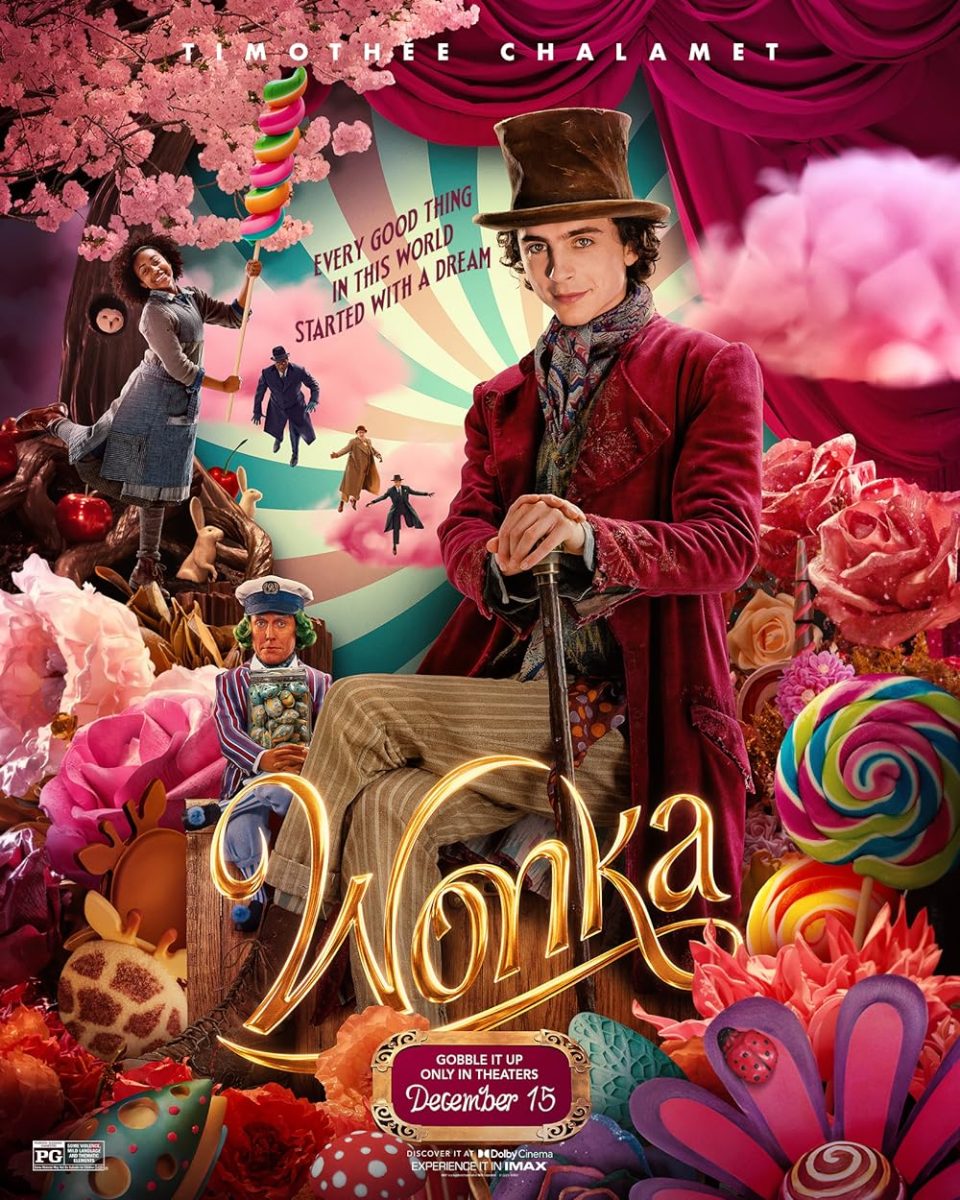The long-awaited film “Wonka”, a prequel based on the original Roald Dahl children’s story, Charlie and the Chocolate Factory, hit theaters in early January. “Wonka” attempts to tell the origin story of unconventional chocolatier Willy Wonka, who was first introduced on the silver screen in 1971 by Gene Wilder in “Willy Wonka and the Chocolate Factory”, and later played by Johnny Depp in the 2005 Tim Burton adaptation. The problem with “Wonka?” It doesn’t begin to measure up against the preceding films.
American-French performer and title actor of “Wonka” Timothee Chalamet is undeniably talented, rightfully earning his household name status in Hollywood. That being said, in “Wonka”, Chalamet misses the mark, failing to capture the essence of Willy Wonka. Chalamet’s Wonka is too bright-eyed and too bushy-tailed as he attempts to open his own chocolate shop. The complexity of Willy Wonka, presented masterfully by Depp and Wilder, is gone. No longer is Willy Wonka charming, eccentric, unsettling, and participating in unethical labor practices. Instead, Chalamet’s Wonka lacks dimension. Throughout the movie, Chalamet played too much into the goofy side of Wonka while forgetting his charming peculiarities
The amount of side-plots prevalent throughout the film is endless: Willy Wonka becomes an indentured servant at a washhouse, a zookeeper reunites with his old fling, Wonka and Noodle milk a giraffe, and the Oompa Loompa origin story is unearthed, well, kind of. Also, Mr. Bean (actor Rowan Atkinson) plays a chocolate addict/Catholic priest, and the chocolate cartel stores its corrupt chocolate in a basement vault at a Catholic Church, protected by 500 monks. Who came up with this? Seriously, what was going on in the writer’s room? The movie is less about Willy Wonka than it is about a corrupt police officer, a chocolate monopoly, being illiterate, an unlikely group enslaved in a basement, grieving the death of a loved one, and an orphan named Noodle. Are you still following?
Did I mention that “Wonka” is a musical? That’s right. Each additional plot comes with its own song. Some songs are tolerable, but others are torture to sit through (Ahem, “Scrub, Scrub”). To make matters worse, the original “Pure Imagination” song lyrics were changed for the film. Why mess with the most magical Willy Wonka song? I was not impressed.
Despite my qualms with the movie, “Wonka” does a good job incorporating the nostalgic magic of the original Wonka story, utilizing beautiful set designs. Most notable is the scene in which Willy and co. open their shop at Galleries Gourmet. The whimsical set design is on par with the old films, featuring a cotton candy tree, a chocolate river, and edible flowers. I’d even go as far as to say that “Wonka” does this set design better than previous films, straying away from the coldness of Burton’s adaptation while being more sophisticated than Wilder’s version. Also memorable are the special effects and CGI used to enhance the film. The floating chocolatiers, actor Hugh Grant as an Oompa Loompa, and Willy Wonka’s portable chocolate factory reminded me of the psychedelically magical Willy Wonka atmosphere I loved so much as a kid. If my review was based on aesthetic and set design alone, “Wonka” would get an A+ from me.
If “Wonka” was a standalone, I would have actually enjoyed it. However, in the context of the past movies…No thanks. I’d rather turn on Burton’s version, or tune into Wilder singing “Pure Imagination” in his purple velvet suit. Maybe I am just not the intended audience for this movie, which likely captured the hearts of elementary schoolers everywhere like the old adaptations captured mine. I would agree to watch “Wonka” again with my little brother, but Timothee Chalamet will never be Willy Wonka to me.




